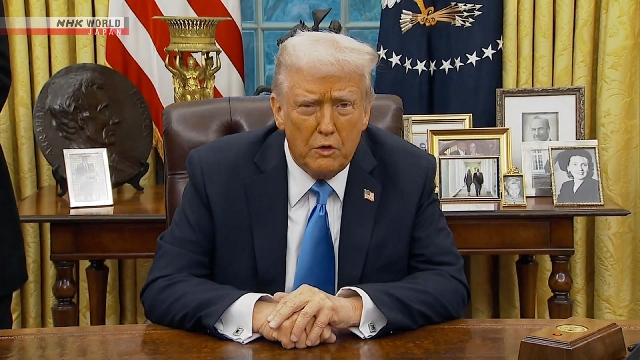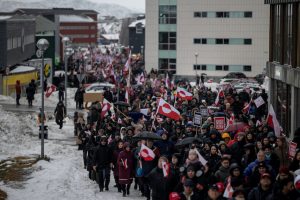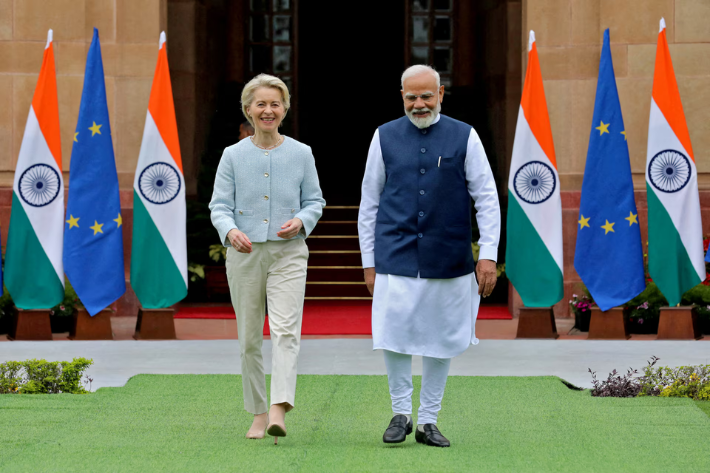Japan’s newly-elected prime minister Sanae Takaichi signed a deal with US President Donald Trump for the two countries to work together on developing rare earth supply chains and nuclear power capabilities.
They signed the documents during Trump’s visit to Japan as part of a larger Asia trip, which will culminate on Thursday with his high-stakes meeting with Chinese president Xi Jinping.
The deal marks a framework agreement between the US and Japan for securing the supply of rare earths that have become the focal point of an intense trade war between Washington and Beijing.
Also on AF: Trump Taps Southeast Asia For Rare Earths Amid China Uncertainty
China, which processes more than 90% of the world’s rare earths, has recently ramped its export restrictions on the minerals central to critical industries ranging from defence to green technologies. And while Trump and Takaichi made no mention of China or its export controls, their agreement is part of a growing global push to build rare earth supply chains alternative to China.
As part of their deal, Japan and the US would use economic policy tools and coordinated investment to speed “development of diversified, liquid, and fair markets for critical minerals and rare earths”, the White House said in a statement.
They aim to provide financial support to selected projects within the next six months, it added.
Both countries would consider a mutually complementary stockpiling arrangement and cooperate with international partners to ensure supply chain security, it said.
Japan is the third country that Trump has struck a deal on rare earths with this week, after similar agreements with Malaysia and Thailand. Thailand is now officially the world’s sixth-largest rare earth producer. Malaysia, meanwhile, lacks the technology to mine and process them, but has an estimated 16.1 million metric tons of rare earth deposits.
Following the deal, Trump lavished praise on Takaichi, Japan’s first female leader, and welcomed her pledge to accelerate the country’s military buildup.
Takaichi, who took office a week ago, is a protege of Trump’s former ally and golfing buddy Prime Minister Shinzo Abe, who was assassinated in 2022. She repeatedly invoked that legacy with gifts and references to the warm ties between the two men, and applauded Trump’s push to resolve global conflicts.
Trump’s spokeswoman Karoline Leavitt said the Japanese leader also promised to nominate Trump for the Nobel Peace Prize.
Nuclear power also in focus
Aside from rare earths, Japan also mentioned the country’s mutual interest to cooperate in the construction of new generation AP1000 nuclear reactors and small modular reactors (SMRs), in a factsheet for the talks.
These could involve Japanese companies such as Mitsubishi Heavy Industries, Toshiba Group and others, along with other cooperation areas.
Nuclear power, including next-generation reactors, as a matter of greater energy security, affordable power supply and export technology, is among the top priorities of Takaichi, who became prime minister last week.
Japan shut down all its reactors after the Fukushima Daiichi nuclear disaster, caused by a powerful 2011 earthquake and subsequent tsunami. China, France, South Korea and Russia, currently dominate global exports of nuclear power technology.
A separate White House statement also mentioned fusion energy as a potential area for cooperation, as it is also favoured by Takaichi.
Tech interest in $550 billion US investment
Meanwhile, about 20 companies from Japan and the US have shown interest in potential investment projects forming part of a promised $550-billion investment package, the factsheet issued by both countries showed.
The massive investment was part of a deal between the two countries in July to guarantee lower tariffs on Japanese automobile imports and other products.
Companies interested in taking part include SoftBank Group, Mitsubishi Electric and Hitachi, according to the list of possible projects.
The list, which covers areas including energy, AI infrastructure and critical minerals, says it could represent some $400 billion in investment.
Westinghouse is looking at building pressurised water reactors and small modular reactors totalling up to $100 billion, with Japanese firms such as Mitsubishi Heavy Industries, Toshiba and IHI potentially involved.
GE Vernova could build small modular reactors and supply power equipment with the involvement of Japanese companies.
SoftBank, whose founder and CEO Masayoshi Son has met with Trump, is interested in a $25 billion project to develop large-scale power infrastructure, according to the list.
Carrier could also supply thermal cooling systems for power infrastructure and involve Japanese companies, while Panasonic could build energy storage systems.
Other interested firms included Murata, TDK and Fujikura.
- Reuters, with additional editing and inputs from Vishakha Saxena
Also read:
Rare earth and the US-China powerplay
Trade Deal Optimism Lifts North Asian Stocks to Fresh Peaks
US, Australia Sign $8.5bn Deal on Rare Earth, Gallium Projects
Trump Admits Threat of 100% Tariffs on China is ‘Not Sustainable’
China Making Exports Of Rare Earth Magnets ‘Increasingly Difficult’
US May ‘Extend Tariff Truce’ If China Delays New Rare Earth Rule
China Stops Most Antimony Exports But Rare Earth Sales to US Soar
China Did Not Agree to Military Use of Rare Earths, US Says
Carmakers Stressed by China’s Curbs on Critical Mineral Exports
China Export Curbs on Rare Earth Magnets: a Trade War Weapon
China Sets up Tracking System to Trace Its Rare Earth Magnets
China’s Critical Minerals Blockade Risks Global Chip Shortage
China’s Gallium Curbs a Headache for EV Carmakers
Western Firms Struggling to Break China’s Grip on Rare Earths
Lessons From Japan on Tackling China’s Rare Earth Dominance























